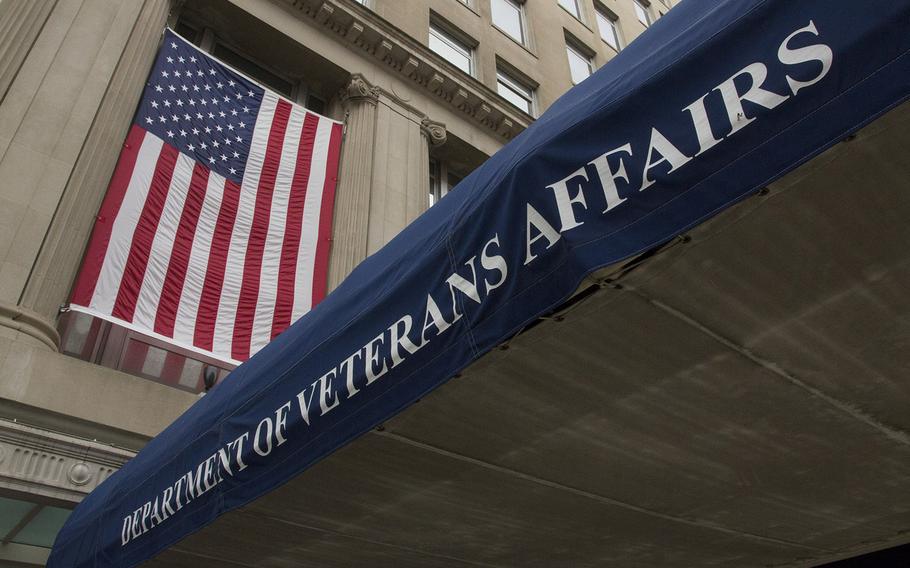
An undated photo of the Department of Veterans Affairs headquarters in Washington, D.C. (Stars and Stripes)
WASHINGTON — The Department of Veterans Affairs will prioritize claims from veterans suffering with cancers that stem from exposure to burn pits and other toxins by handling their cases immediately to get them access to care and benefits as quickly as possible, agency officials said Monday.
“This work is a part of President [Joe] Biden’s vision for the Cancer Moonshot, and it’s a part of his broader efforts to end cancer as we know it,” VA Secretary Denis McDonough said Monday at a National Press Club luncheon. “So, we will expedite veterans' claims if they have been diagnosed with melanoma, brain cancer, neck cancer, pancreatic cancer, kidney cancer, glioblastoma, head cancer of any type, respiratory cancer of any type, reproductive cancer of any type, gastrointestinal cancer of any type, lymphoma of any type, and lymphomatic cancer of any type.”
The VA said nearly 14,000 claims by veterans for treatment to battle cancers have been submitted under The Sergeant First Class Heath Robinson Honoring Our Promise to Address Comprehensive Toxics Act of 2022, or PACT Act, since President Joe Biden signed it into law on Aug. 10. Today is National Cancer Awareness Day.
“We are working hard to get benefits to all veterans who qualify under the PACT ACT as soon as possible, and veterans living with cancer are at particular risk,” McDonough said. “Expediting claims for these vets will ensure that they get the care and benefits they need and so rightly deserve.”
The PACT Act seeks to provide an easier path to health care and benefits for veterans who served near open-air burn pits, which were used throughout the 1990s and the post-9/11 wars to burn garbage, jet fuel, and other materials. Veterans diagnosed with cancer, respiratory issues and lung disease at young ages have blamed exposure to the toxic fumes from these pits, but the VA contended for years that there wasn’t sufficient evidence to support their claims.
The new law also improves the VA’s workforce and its claims processing to speed up efforts to meet the needs of veterans and establish 31 new VA health care facilities in 19 states. The VA said it will begin processing all PACT Act-related claims on Jan. 1 and anticipates a surge of new claims. Thus, the VA announced it is hiring at 56 regional offices and 39 special processing and call centers within the United States and Puerto Rico.
Additionally, the law expands health care eligibility to post-9/11 combat veterans and adds 23 conditions related to burn pits and other toxic exposures to the VA’s list of illnesses presumed to have been contracted during their military service.
The expanded list includes presumptions related to Agent Orange exposure in Thailand, Cambodia, Laos, Guam, American Samoa and Johnston Atoll.
In August, the VA declared all 23 health conditions outlined in the PACT Act “presumptive” from the date the bill was signed, reducing the burden on veterans or their survivors to prove that certain diseases were caused by service-related exposure to toxins and burn pits.
Cancer Moonshot is a Biden administration initiative that was restarted in February. The initiative has a goal to reduce the cancer death rate by at least 50% during the next 25 years and improve the experience of people and their families living with and surviving cancer. Biden originally launched Cancer Moonshot in 2016 when he was vice president.
Part of the VA’s fiscal 2023 budget includes $81 million in research and $167 million in medical care funds to support Cancer Moonshot and precision oncology, which utilizes information from a person’s tumor to diagnose, create a plan of treatment, and learn how the treatment is working.
It would also fund research and programs that address cancer care, rare cancers, cancers in women, genetic counseling, and consultation that would advance tele-oncology care.
The announcement comes on the same day the VA said it will expand toxic screening Tuesday to all veterans enrolled in its health care system in the United States. The PACT Act requires the VA incorporate screenings to help determine potential toxic exposures in veterans from their active-duty service.
In September, the VA tested the toxic exposure screening at 12 VA medical centers and said more than 19,000 veterans were screened during the testing phase to ensure it prioritized the veteran experience and centered on veteran needs. Moreover, the agency said it found a 37% concern for exposure among the veterans who were screened.
The VA said 112,949 claims by veterans have been submitted as of Oct. 22 under the PACT Act since President Joe Biden signed it into law.